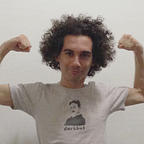Why we believe everybody must learn programming
Code education is about literacy, fun and freedom. And power.
Awakened by your phone, you start the washing machine. Oh look, a new fully automated train in the metro. At lunch you pay with your credit card. In the evening you enjoy the timed lights on the Eiffel Tower. It’s an endless list. There is not an hour of your life (one minute?) without a programmer participating in it by writing… code.
Technologies surrounding us are animated by code. This is transforming society and our lives, in nearly every aspect. The examples of this transformation… well, you’ll be able to find them by yourself. You already know them, most probably.
The danger of de facto illiteracy
If I am illiterate in our society — if I can’t read and write— I find myself powerless and excluded in many situations. I am then very easy to manipulate, drowned in the omnipresence of text, rules and laws that I can’t interpret.
Similarly, as we are now in a completely computerized society, one who doesn’t master the culture of code will be more and more powerless, excluded, and manipulated when facing new technologies.
Is there such a thing as code illiteracy? The concept is appealing because code is just text. A text that is used to create a program, an app, a website. A special kind of text, since it acts directly on the world (and sometimes with obvious hostility, as when it controls the gates of the subway [in french, but worth it])
In the early 19th century, a minority could read and write. And an even smaller minority were mastering the dominant culture based on text, contracts, legal texts… (once again, codes.)
Just as today only a small number of people can read and write computer code.
From invisible control to liberating creativity
The founders of Facebook, YouTube, Twitter, Google, are all coders. These web platforms have transformed society in just a few years.
In fact, they scare people. And maybe rightly. Code is Law. Code is Power.
The web and venture capital have transformed the skills of these programmers-entrepreneurs into a new, almost magical talent:
The talent of writing, from their rooms, new social rules that spread and are adopted in a few months.
This talent should not remain in the hands of an elite group of new scribes. We must actively spread it.
Read and write, once again
We all need, sometimes, to count; we all need, sometimes, to read and write; and now we all need, sometimes, to code, without always realizing it.
If we want our children to be creative, independent — if we hope for them as adults to use technology for their own freedom — we must pass on the code culture.
But is that something all kids must learn? Yes, *all* kids must learn programming.
Because the kids we would leave aside would have to use tools they can’t modify. They would be subjected to rules they can’t decrypt.
Also, also: they would miss all the fun.
A first version of this post was part of a short series of articles published after the second Coding Goûter in 2011. This is a revised (better) edition for Medium.
